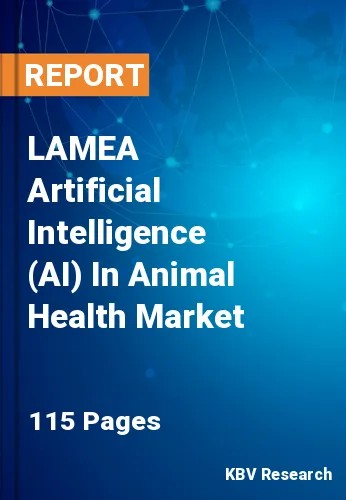The Latin America, Middle East and Africa Artificial Intelligence (AI) In Animal Health Market would witness market growth of 20.5% CAGR during the forecast period (2023-2030).
The use of AI in animal health extends beyond diagnosis and therapy to other facets of veterinary medicine. For instance, AI-driven chatbots and virtual assistants have been created to provide pet owners with prompt access to fundamental health information and recommendations. Furthermore, AI-driven analytics tools support veterinarians in streamlining operations, optimizing resource allocation, and boosting operational effectiveness.
Machine learning and computer vision make AI-powered diagnostic tools possible, allowing for the precise and effective interpretation of medical images. AI systems that analyze significant health and genetic datasets provide personalized animal treatment strategies. Platforms for AI analytics optimize resource allocation and streamline veterinary operations. Considerable investment is drawn to the market, encouraging partnerships between digital firms and veterinary institutions. AI in animal health is expected to experience substantial growth as the technology develops, influencing the outlook of animal healthcare.
Regarding early diagnosis and surveillance of zoonotic illnesses (those that can spread from animals to people), AI's capacity to scan large data sets and spot trends can be helpful. This proactive approach may protect the public's health and assist in stopping potential outbreaks.
Animal diseases are a persistent hazard to domestic pets and livestock and a significant socioeconomic barrier to their expansion in Sub-Saharan African nations. Africa is linked to most livestock ailments recognized by the World Organization for Animal Health (OIE), which makes frequent administration of veterinary medications essential. Due to increasing demand, the cattle sector has recently experienced an explosion. The need for animal care in the region has since grown considerably. This is also expected to assist the expansion of LAMEA region's market.
The Brazil market dominated the LAMEA Artificial Intelligence (AI) In Animal Health Market by Country in 2022, and would continue to be a dominant market till 2030; thereby, achieving a market value of $57.4 million by 2030. The Argentina market is estimated to grow at a CAGR of 21.2% during (2023 - 2030). Additionally, The UAE market would experience a CAGR of 20.2% during (2023 - 2030).
Based on Animal type, the market is segmented into Companion Animal, and Production Animals. Based on Solutions, the market is segmented into Hardware, and Software & Services. Based on Application, the market is segmented into Diagnostics, Identification, Tracking, & Monitoring, and Others. Based on countries, the market is segmented into Brazil, Argentina, UAE, Saudi Arabia, South Africa, Nigeria, and Rest of LAMEA.
Free Valuable Insights: The Worldwide Artificial Intelligence (AI) In Animal Health Market is Projected to reach USD 3.6 Billion by 2030, at a CAGR of 18.1%
The market research report covers the analysis of key stake holders of the market. Key companies profiled in the report include Zoetis, Inc., Merck & Co., Inc., Heska Corporation (Antech Diagnostics, Inc), SignalPET, LLC, VetCT Specialists Limited, Veterinary Imaging Center of San Diego, Inc (Vetology), OneCup AI, Petriage, ImpriMed, Inc., and IDEXX Laboratories, Inc.
By Animal type
By Solutions
By Application
By Country
Our team of dedicated experts can provide you with attractive expansion opportunities for your business.

